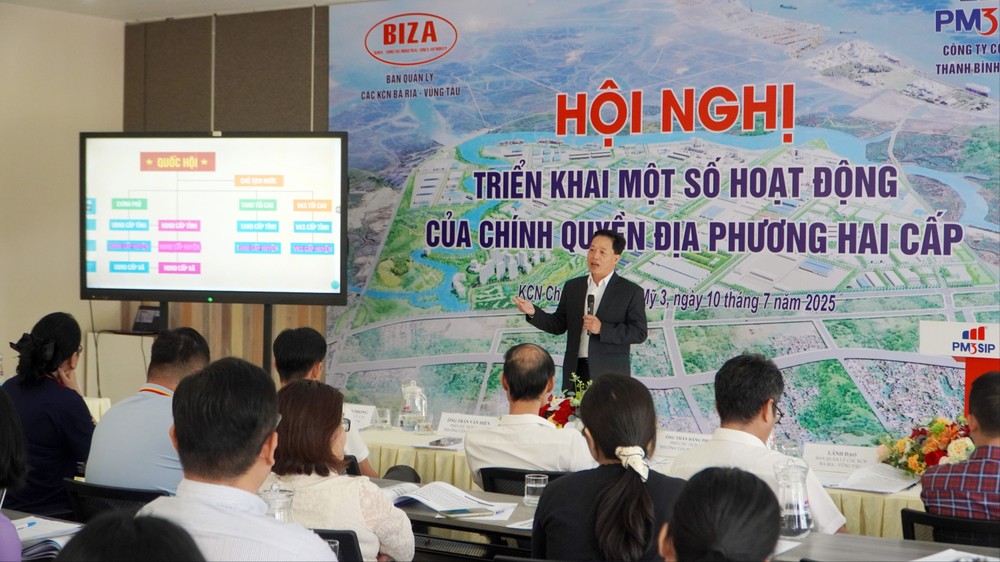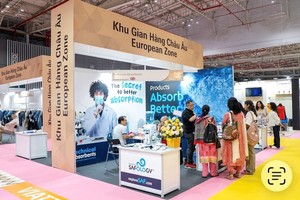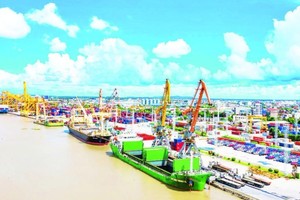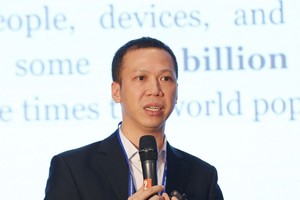State management agencies and industrial park infrastructure investors agree that merging Ho Chi Minh City, Binh Duong, and Ba Ria–Vung Tau, along with implementing the two-tier local government model, will streamline and accelerate administrative procedures for residents and businesses including industrial park investors.

The Ba Ria–Vung Tau Industrial Parks Management Board in coordination with the People's Committees of Tan Phuoc and Tan Hai wards in HCMC and Thanh Binh - Phu My Joint Stock Company - the investor of Phu My 3 Industrial Park- yesterday organized a conference to launch several initiatives under the two-tier local government model.
Speaking at the conference, Head of the Ba Ria–Vung Tau Industrial Parks Management Board Vo Thanh Phong said that the implementation of the two-tier local government model is intended to bring government closer to both citizens and businesses, enhancing service delivery.
He noted that simplifying administrative layers will accelerate appraisal and licensing processes, cutting down the time businesses spend navigating bureaucratic hurdles.
Under the broader policy framework, the Ba Ria–Vung Tau Industrial Parks Management Board will merge with its counterparts in Ho Chi Minh City and Binh Duong to form a unified state management body for export processing zones and industrial parks in the newly planned mega-urban region. This area is projected to include 105 industrial parks covering nearly 50,000 hectares.
Currently, 59 parks covering over 23,000 hectares are operational with nearly 5,530 projects and approximately $75 billion in total registered investment capital, generating employment for nearly 840,000 workers.
Ba Ria - Vung Tau Province is proactively addressing potential challenges for investors within its industrial parks, particularly concerns regarding the impact of geographical distance on administrative processes. Head of the Ba Ria - Vung Tau Industrial Parks Management Board Vo Thanh Phong acknowledged these considerations but highlighted significant advancements already in place to mitigate them.
According to Mr. Phong, the vast majority of investment-related procedures within the industrial park system are currently handled through sophisticated online platforms. This digital approach ensures centralized processing and leverages a one-stop shop model, drastically reducing the need for physical travel and simplifying interactions for businesses and investors alike. This streamlined system is designed to enhance efficiency and transparency.
Furthermore, the province is strategically planning the location of facilities belonging to various state management agencies. These offices will be situated in suitable and easily accessible areas, ensuring they are readily available to provide optimal service and support to investors and operating businesses. This physical presence, combined with the robust online infrastructure, creates a comprehensive and convenient service ecosystem.
These combined efforts are projected to yield substantial benefits for those looking to invest or expand within Ba Ria - Vung Tau's industrial zones. It is estimated that, in the immediate future, the time required to complete administrative procedures will see a significant reduction of approximately 30 percent compared to previous benchmarks. This expected improvement underscores the province's commitment to fostering a highly favorable and efficient business environment.
At the conference, representatives of Thanh Binh - Phu My Joint Stock Company informed secondary investors in Phu My 3 Industrial Park about the operation of the two-level local government model and the simplification of administrative procedures, especially investment and construction procedures in industrial parks.
Effective July 1, 2025, a substantial set of new regulations on decentralization and delegation of authority will be implemented. These changes involve the reassignment of approximately 130 tasks. Notably, nearly 100 tasks will be transferred from administrations in districts to their peers in communes including functions such as construction licensing, construction order management, and project acceptance.
Additionally, many other responsibilities will be decentralized to grassroots authorities, bringing administrative functions closer to the populace and enterprises.
Many administrative procedures will be reduced and simplified, helping to shorten processing time and increase efficiency in serving people and businesses. In the field of urban and rural planning, commune-level authorities are empowered to establish, appraise, and approve small-scale plans, while the provincial level will proactively handle inter-commune planning and large projects.
A representative of Thanh Binh - Phu My Company stated that the two-level local government model not only streamlines the apparatus but also creates a flexible and suitable legal foundation, creating the best conditions for people, businesses in general and investors in industrial parks in particular.
At the conference, representatives from the Ba Ria - Vung Tau Industrial Park Management Board, the People's Committees of Tan Phuoc and Phuoc Hai wards, infrastructure investors, and industrial park infrastructure investors discussed and provided updates on specific matters concerning the activities of the two levels of government and administrative procedures relevant to investment and construction within industrial parks.
























